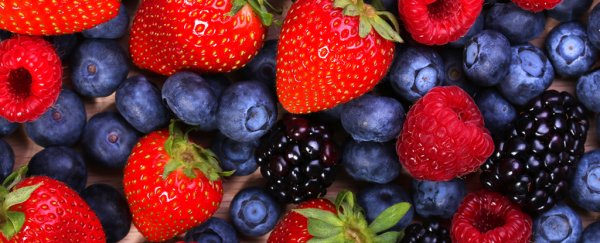Eating fruits such as apples, pears, and berries could be a great way to maintain a healthy weight, a new study has found, with an increased consumption of dietary flavonoids – natural compounds found in fruits and vegetables – being linked to less weight gain over time.
A team of nutritionists led by Harvard University looked at the dietary intake of seven different subclasses of flavonoid and contrasted it with weight changes in a long-term study of 124,086 men and women in the US. They found that extra portions of high-flavonoid fruits or vegetables made a difference in age-related weight gain.
It's not the first time flavonoids have been found to confer health benefits and potential weight gain prevention, but previous research has mostly focused on the flavonoid found in green tea, which has been noted for its abilities in helping people keep weight off.
In this case, the researchers looked at the dietary intake of seven different subclasses of flavonoid and contrasted it with weight changes in a long-term study of 124,086 men and women in the US.
The participants self-reported their weight, lifestyle habits, and diet over a period of 24 years, and the findings, reported in The BMJ, showed that those who ate more flavonoids gained less weight over the course of the study.
According to the results, the greatest association was for the flavonoid subclasses of anthocyanins, flavonoid polymers, and flavonols. Each extra portion of particular fruits or vegetables per day in the study – per this table – was linked to 0.07 to 0.10 kg (0.16 to 0.23 lbs) less weight gained over four-year intervals during the period.
That's not exactly a massive amount of less weight gained, but every little bit counts, right? And when all you have to do to secure the benefits is tuck into delicious food like blueberries and strawberries – the primary source of anthocyanins – it's a price we're willing to pay.
Tea, apples, orange juice, oranges, and onions are other key foods to stock (and snack) up on, in addition to apples, pears, and a range of other fruit and vegetables. You can find more information on all the foods analysed in the freely available paper.
The authors acknowledge their research is only an observational study, so no definite conclusions can be made. Scientists are yet to suggest a causal link between flavonoids and weight loss, because it's not clear what biological mechanisms might be at play here.
Per the findings of previous research on tea, it's possible the flavonoids could be blocking the digestion and absorption of starch.
But nonetheless optimising your diet among these kinds of healthy fruits and vegetables – which are already known to be good for you – can't hurt, especially when most of us already aren't getting enough.
"Most Americans consume less than 1 cup (less than two servings) of fruits and less than 2 cups of vegetables daily, and juice and potatoes are major contributors to intake," the authors write. "Beyond increasing intake to current recommendations of two cups of fruit and 2.5 cups of vegetables per day, people may be able to maximise their health benefit by including optimal fruits and vegetables in their daily diets."
